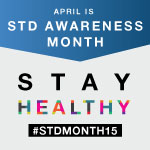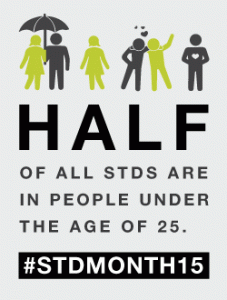 Sexual health. For some people the mere mention of it is enough to send a shiver down their spine.
Sexual health. For some people the mere mention of it is enough to send a shiver down their spine.
For expats, while still suffering from the same fears about getting tested, enjoy the added frustration of having to learn the ins and outs of a new health system, navigating where to go, who to talk to, and getting health cover. It may seem difficult and daunting but sexual health is important no matter where you live.
April is STD Awareness Month and this is the best time to make a change, learn the facts and get yourself tested #GYT
The Ostrich Problem
Sexual health is one of the last taboos of our societies we would prefer to ignore the problem and hope it disappears rather than deal with it. With discussions about sex and all things related kept firmly behind closed doors, it is easy to see how societies have grown used to ignoring and refusing to talk about sexual health issues. People would rather stick their head in the ground than talk to their partner, family or even doctor about their worries.
Parents especially can find this a difficult topic to approach as it is hard enough to accept that their teenagers might be sexually active, let alone broaching the subject of STDs with their children. As a result, accurate information is hard to find, while harmful myths seem to be cropping up all over the internet. The only way to change this attitude is simple: get talking.
Facts & statistics
Half of all STDs occur in people under the age of 25, despite the fact this only represents a quarter of people having sex. Young people are twice as likely to contract an STD than anyone else due to a lack of information and ignorance of the dangers of unsafe sex.
It is fairly common knowledge these days that using a condom significantly reduces the risk of catching an STD. What many people might not be aware of, is that the birth control pill, although can prevent any unwanted pregnancies, does not protect you from STDs.
- More than 1 million people worldwide contract an STD every day.
- Each year, an estimated 500 million people become ill with one of the following: chlamydia, gonorrhoea, syphilis and trichomoniasis.
- More than 530 million people have the virus that causes genital herpes (HSV2).
- The majority of STDs do not show any symptoms.
- Some STDs can triple the risk of HIV acquisition.
- Drug resistance, especially for gonorrhoea, is a major threat to reducing the impact of STDs worldwide and is a major reason for the importance of being tested regularly.
Difficulties faced by expats
This can be an even greater issue for expat families, with all the extra stress and issues that arrive with moving a whole family to a new country it can be easy for things like sexual health discussions and testing, which are already low on people’s priorities, to drop even further.
Moving to a new country also means you are less likely to know how to go about finding sexual health advice. Many countries do offer specific sexual health clinics, although these will vary from country to country. Unfortunately these services are not always free.
What you need to do
 It is important to sign up to a medical practice as early as possible, make sure your EHIC is up to date if you are an EU citizen or you have adequate health insurance cover. It is important to check this thoroughly as only some providers cover what they refer to as “elective” checks and this is cover that you and your family will need.
It is important to sign up to a medical practice as early as possible, make sure your EHIC is up to date if you are an EU citizen or you have adequate health insurance cover. It is important to check this thoroughly as only some providers cover what they refer to as “elective” checks and this is cover that you and your family will need.
As an expat, the responsibility of getting yourself checked out is firmly in your hands, as getting checked out may come with a few more hurdles due to cultural differences or language barriers compared to what you are used to at home. Why not ask your expat friends if they have had any experience of sexual health clinics in your new home.
There is some useful information here to get the ball rolling and remember to get yourself tested! #STDMonth15